| Listing 1 - 10 of 45 | << page >> |
Sort by
|
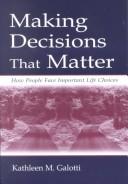
ISBN: 080583396X 1135664889 1282326406 9786612326400 1410613097 0805833978 0585438579 9780585438573 9781410613097 9780805833966 9780805833973 9781135664831 9781135664879 9781135664886 Year: 2002 Publisher: Mahwah, N.J. L. Erlbaum
Abstract | Keywords | Export | Availability | Bookmark
 Loading...
Loading...Choose an application
- Reference Manager
- EndNote
- RefWorks (Direct export to RefWorks)
Researchers studying decision making have traditionally studied the phenomenon in the laboratory, with hypothetical decisions that may or may not involve the decision maker's values, passions, or areas of expertise. The assumption is that the findings of these well-controlled laboratory studies will shed light on the important decisions people make in their everyday lives. This book examines that assumption. The volume begins by covering four basic phases of decision making: setting or clarifying goals, gathering information, structuring the decision, and making a final choice. Comprehensive reviews of existing literature on each of these topics is provided. Next, the author examines differences in decision making as a function of several factors not typically discussed in the literature: the type of decision being made (e.g., legal, medical, moral) and the existence of individual differences in the decision maker (developmental differences, individual differences in style or temperament, differences as a function of expertise). The author then examines the topic of group decision making, contrasting it with individual decision making. The volume concludes with some observations and suggestions for improving peoples' everyday decision making. This book is intended for use as a core textbook or supplement for courses in psychology, education, or allied disciplines. It will also be an invaluable resource for people who work with people making decisions in various applied settings, such as schools, universities, and health care centers. Researchers studying decision making have traditionally studied the phenomenon in the laboratory, with hypothetical decisions that may or may not involve the decision maker's values, passions, or areas of expertise. The assumption is that the findings of these well-controlled laboratory studies will shed light on the important decisions people make in their everyday lives. This book examines that assumption. The volume begins by covering four basic phases of decision making: setting or clarifying goals, gathering information, structuring the decision, and making a final choice. Comprehensive reviews of existing literature on each of these topics is provided. Next, the author examines differences in decision making as a function of several factors not typically discussed in the literature: the type of decision being made (e.g., legal, medical, moral) and the existence of individual differences in the decision maker (developmental differences, individual differences in style or temperament, differences as a function of expertise). The author then examines the topic of group decision making, contrasting it with individual decision making. The volume concludes with some observations and suggestions for improving peoples' everyday decision making. This book is intended for use as a core textbook or supplement for courses in psychology, education, or allied disciplines. It will also be an invaluable resource for people who work with people making decisions in various applied settings, such as schools, universities, and health care centers.
Decision making --- Decision making. --- Deciding --- Decision (Psychology) --- Decision analysis --- Decision processes --- Making decisions --- Management --- Management decisions --- Choice (Psychology) --- Problem solving --- #PBIB:2002.4 --- #PBIB:2003.3 --- #PBIB:gift 2003
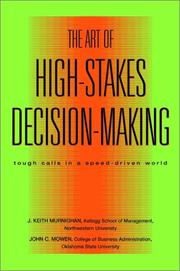
ISBN: 0471415766 Year: 2002 Publisher: New York Wiley
Abstract | Keywords | Export | Availability | Bookmark
 Loading...
Loading...Choose an application
- Reference Manager
- EndNote
- RefWorks (Direct export to RefWorks)
Decision making. --- Decision making --- 65.012.4 --- 65.012.4 Management. Directorate. Technique and methods of management --- Management. Directorate. Technique and methods of management --- Deciding --- Decision (Psychology) --- Decision analysis --- Decision processes --- Making decisions --- Management --- Management decisions --- Choice (Psychology) --- Problem solving
Book
ISBN: 1281929840 9786611929848 9812777911 9789812777911 Year: 2002 Publisher: River Edge, N.J. : World Scientific,
Abstract | Keywords | Export | Availability | Bookmark
 Loading...
Loading...Choose an application
- Reference Manager
- EndNote
- RefWorks (Direct export to RefWorks)
Decision making and control are two fields with distinct methods for solving problems, and yet they are closely related. This book bridges the gap between decision making and control in the field of fuzzy decisions and fuzzy control, and discusses various ways in which fuzzy decision making methods can be applied to systems modeling and control.Fuzzy decision making is a powerful paradigm for dealing with human expert knowledge when one is designing fuzzy model-based controllers. The combination of fuzzy decision making and fuzzy control in this book can lead to novel control schemes that impr
Control theory. --- Decision making. --- Fuzzy decision making. --- Decision making --- Fuzzy mathematics --- Deciding --- Decision (Psychology) --- Decision analysis --- Decision processes --- Making decisions --- Management --- Management decisions --- Choice (Psychology) --- Problem solving --- Dynamics --- Machine theory

ISBN: 0815336780 9780815336785 9780203822371 9781136764226 9781136764264 9781136764271 9780815336792 Year: 2002 Publisher: Abingdon Routledge
Abstract | Keywords | Export | Availability | Bookmark
 Loading...
Loading...Choose an application
- Reference Manager
- EndNote
- RefWorks (Direct export to RefWorks)
Choice (Psychology) --- Criminal psychology --- Criminology --- Decision making --- Psychology --- Deciding --- Decision (Psychology) --- Decision analysis --- Decision processes --- Making decisions --- Management --- Management decisions --- Problem solving --- Crime --- Social sciences --- Criminals --- Criminal psychiatry --- Psychology, Criminal --- Criminal anthropology --- Psychology, Pathological --- Study and teaching

ISBN: 0511839820 0511584202 052166084X 0521179955 Year: 2002 Publisher: Cambridge : Cambridge University Press,
Abstract | Keywords | Export | Availability | Bookmark
 Loading...
Loading...Choose an application
- Reference Manager
- EndNote
- RefWorks (Direct export to RefWorks)
Behavioral decision theory draws on experimental research in cognitive psychology to provide a descriptively accurate model of human behavior. It shows that people systematically violate the normative assumptions of economic rationality by miscalculating probabilities and making choices based on one-economic criteria. Behavioral decision theory's ability to capture the complexity of human judgments and choices makes it a useful foundation for improving public policy analysis, design, and implementation. Originally published in 2001, this volume showcases the research of leading scholars who are working on applications of behavioral decision theory in diverse policy settings. It is designed to give policy analysts and practitioners who are non-psychologists a clearer understanding of the complexities of human judgment and choice, and suggest how to integrate behavioral decision theoretic insights into the policy sciences. This interdisciplinary volume should be insightful and useful wherever people's judgments and choices matter for policy formulation, acceptance, and effectiveness.
Policy sciences. --- Decision making. --- Deciding --- Decision (Psychology) --- Decision analysis --- Decision processes --- Making decisions --- Management --- Management decisions --- Choice (Psychology) --- Problem solving --- Policy-making --- Policymaking --- Public policy management --- Decision making --- Health Sciences --- Psychiatry & Psychology
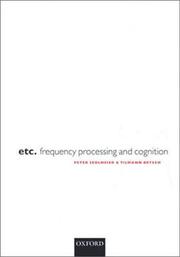
ISBN: 0198508638 Year: 2002 Publisher: Oxford Oxford University Press
Abstract | Keywords | Export | Availability | Bookmark
 Loading...
Loading...Choose an application
- Reference Manager
- EndNote
- RefWorks (Direct export to RefWorks)
Cognitive psychology --- Developmental psychology --- #SBIB:316.23H1 --- 316.75 --- Kennissociologie --- Kennissociologie. Ideologie --- 316.75 Kennissociologie. Ideologie --- Decision making --- Judgment --- Judgement --- Knowledge, Theory of --- Language and languages --- Psychology --- Thought and thinking --- Wisdom --- Deciding --- Decision (Psychology) --- Decision analysis --- Decision processes --- Making decisions --- Management --- Management decisions --- Choice (Psychology) --- Problem solving
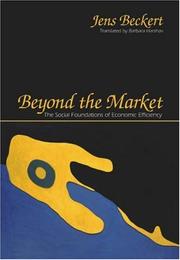
ISBN: 0691049076 9786612087721 9786612935312 1282935313 128208772X 140082544X 9781400825448 9780691049076 Year: 2002 Publisher: Princeton (N.J.): Princeton university press,
Abstract | Keywords | Export | Availability | Bookmark
 Loading...
Loading...Choose an application
- Reference Manager
- EndNote
- RefWorks (Direct export to RefWorks)
Beyond the Market launches a sociological investigation into economic efficiency. Prevailing economic theory, which explains efficiency using formalized rational choice models, often simplifies human behavior to the point of distortion. Jens Beckert finds such theory to be particularly weak in explaining such crucial forms of economic behavior as cooperation, innovation, and action under conditions of uncertainty--phenomena he identifies as the proper starting point for a sociology of economic action. Beckert levels an enlightened critique at neoclassical economics, arguing that understanding efficiency requires looking well beyond the market to the social, cultural, political, and cognitive factors that influence the coordination of economic action. Beckert searches social theory for the components of an alternative theory of action, one that accounts for the social embedding of economic behavior. In Durkheim and Parsons he finds especially useful approaches to cooperation; in Luhmann, a way to understand how people act under highly contingent conditions; and in Giddens, an understanding of creative action and innovation. Together, these provide building blocks for a research program that will yield a theoretically sophisticated understanding of how economic processes are coordinated and the ways that markets are embedded in social, cultural, and cognitive structures. Containing one of the most fully informed critiques of the neoclassical analysis of economic efficiency--as well as one of the most thoughtful blueprints for economic sociology--this book reclaims for sociology the study of one of the most important arenas of human action.
Economics --- Decision making --- Sociological aspects --- Social aspects --- -Decision making --- -306.34 --- Deciding --- Decision (Psychology) --- Decision analysis --- Decision processes --- Making decisions --- Management --- Management decisions --- Choice (Psychology) --- Problem solving --- Economic theory --- Political economy --- Social sciences --- Economic man --- Social aspects. --- Sociological aspects. --- Economic sociology --- Socio-economics --- Socioeconomics --- Sociology of economics --- Sociology --- Economic order --- Economics - Sociological aspects --- Decision making - Social aspects
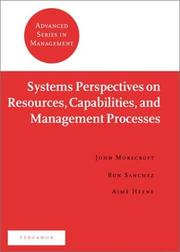
ISBN: 0080437788 Year: 2002 Publisher: Amsterdam Pergamon
Abstract | Keywords | Export | Availability | Bookmark
 Loading...
Loading...Choose an application
- Reference Manager
- EndNote
- RefWorks (Direct export to RefWorks)
Business policy --- Organizational effectiveness --- Decision making --- System analysis --- Efficacité organisationnelle --- Prise de décision --- Analyse de systèmes --- 658.012.4 --- Systems analysis --- Network theory --- System theory --- Mathematical optimization --- Management --- Organization --- Deciding --- Decision (Psychology) --- Decision analysis --- Decision processes --- Making decisions --- Management decisions --- Choice (Psychology) --- Problem solving --- Business management, administration. Commercial organization--?.012.4 --- Decision making. --- Organizational effectiveness. --- System analysis. --- 658.012.4 Business management, administration. Commercial organization--?.012.4 --- Efficacité organisationnelle --- Prise de décision --- Analyse de systèmes --- Network analysis --- Network science
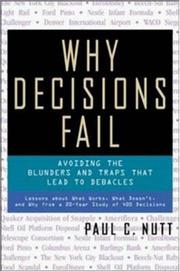
ISBN: 9781576751503 1576751503 9786612299063 1282299069 1605091499 9781605091495 9781282299061 6612299061 Year: 2002 Publisher: San Francisco, CA Berrett-Koehler Publishers
Abstract | Keywords | Export | Availability | Bookmark
 Loading...
Loading...Choose an application
- Reference Manager
- EndNote
- RefWorks (Direct export to RefWorks)
Why decisions fail critiques 15 infamously bad decisions that became public debacles. Including the Firestone tire recall and Quakers failed acquisition of Snapple, the author examines how these mistakes could have been avoided and explains how any organizations decision-making process can be improved to prevent such failures. Paul Nutt began by looking at 400 decisions made by top managers involving such topics as products and services, pricing and markets, personnel policy, technology acquisition, and strategic reorganization. Analyzing how each decision was made, he determined that two out of three decisions were based on failure-prone or questionable tactics. He identifies these key errors and suggests alternatives that have proven successful.
Decision making. --- Prise de décision --- Decision making --- Management Theory --- Management --- Business & Economics --- #SBIB:044.IOS --- #SBIB:35H412 --- #SBIB:35H200 --- BPB0711 --- 35.073 --- Deciding --- Decision (Psychology) --- Decision analysis --- Decision processes --- Making decisions --- Management decisions --- Choice (Psychology) --- Problem solving --- Beleidscyclus: vaststelling, besluitvorming --- Overheidsmanagement: algemene werken --- Economische en juridische positie van overheidsdiensten. Betoelaging, beheer van overheidsorganen. Management van overheidsorganen --- 35.073 Economische en juridische positie van overheidsdiensten. Betoelaging, beheer van overheidsorganen. Management van overheidsorganen --- Industrial management --- Prise de décision
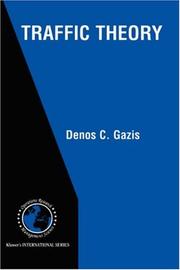
ISBN: 9781402070952 1402070950 9780306482175 0306482177 Year: 2002 Publisher: Dordrecht : Kluwer Academic Publishers, LLC,
Abstract | Keywords | Export | Availability | Bookmark
 Loading...
Loading...Choose an application
- Reference Manager
- EndNote
- RefWorks (Direct export to RefWorks)
“Everything should be made as simple as possible—but not simpler” Albert Einstein Traffic Theory, like all other sciences, aims at understanding and improving a physical phenomenon. The phenomenon addressed by Traffic Theory is, of course, automobile traffic, and the problems associated with it such as traffic congestion. But what causes congestion? Some time in the 1970s, Doxiades coined the term "oikomenopolis" (and "oikistics") to describe the world as man's living space. In Doxiades' terms, persons are associated with a living space around them, which describes the range that they can cover through personal presence. In the days of old, when the movement of people was limited to walking, an individual oikomenopolis did not intersect many others. The automobile changed all that. The term "range of good" was also coined to describe the maximal distance a person can and is willing to go in order to do something useful or buy something. Traffic congestion is caused by the intersection of a multitude of such "ranges of good" of many people exercising their range utilisation at the same time. Urban structures containing desirable structures contribute to this intersection of "ranges of good". xii Preface In a biblical mood, I opened a 1970 paper entitled "Traffic Control -- From Hand Signals to Computers" with the sentence: "In the beginning there was the Ford".
Traffic flow. --- Circulation --- Traffic flow --- Transportation Economics --- Business & Economics --- Operations research. --- Decision making. --- Regional economics. --- Spatial economics. --- Industrial organization. --- Operations Research/Decision Theory. --- Regional/Spatial Science. --- Industrial Organization. --- Industries --- Organization --- Industrial concentration --- Industrial management --- Industrial sociology --- Spatial economics --- Economics --- Regional economics --- Regional planning --- Regionalism --- Space in economics --- Deciding --- Decision (Psychology) --- Decision analysis --- Decision processes --- Making decisions --- Management --- Management decisions --- Choice (Psychology) --- Problem solving --- Operational analysis --- Operational research --- Industrial engineering --- Management science --- Research --- System theory --- Decision making
| Listing 1 - 10 of 45 | << page >> |
Sort by
|

 Search
Search Feedback
Feedback About UniCat
About UniCat  Help
Help News
News